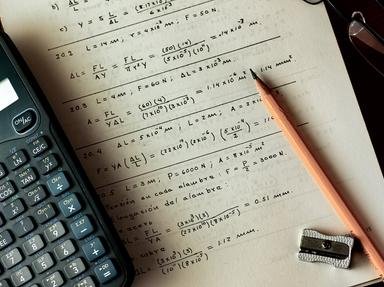Quiz Answer Key and Fun Facts
1. Let's see if you understood the definition of an arithmetic sequence. Which of the following is *not* an arithmetic sequence?
2. An arithmetic sequence can be finite (have a limited length) or infinite. Which of the following sets of numbers, when sorted from smallest to largest, would form an infinite arithmetic sequence?
3. Sometimes interesting arithmetic sequences can be as short as three elements as in the following problem: A triangle has three angles whose measures in degrees form an arithmetic sequence. Which angle do you know now?
4. Some of the most interesting properties of arithmetic sequences are unveiled when you start at the first element and begin adding them up, stopping at an arbitrary place. Take the sequence of odd numbers and start adding: 1+3+5+7+9+11+... Stop anywhere you want. What will always be true about the sum?
5. Let's try a tricky sum: I will tell you neither the starting value of an arithmetic sequence nor the difference between two adjacent elements. They are however both integers. You stop adding after any odd number of elements. What can you say about the sum?
6. You have an arithmetic sequence starting with the number 1 and you know its step value (the difference between two adjacent elements) is a positive integer. What can you safely say about the 701st element of the sequence?
7. The only thing you know about the next arithmetic sequence is that it starts with an integer and its step is an odd positive integer which is not evenly divisible by 5. In its first one thousand elements, will there be any elements evenly divisible by 1000?
8. You know of a given infinite sequence that it is arithmetic. How many elements of this sequence do you need to know, at the absolute minimum, to be able to calculate all of them? (An element is known only if you know both its position in the series and its value)
9. Now a slightly different scenario: You do NOT know whether a given infinite sequence is arithmetic. How many elements of the series do you need to know to confirm that it is definitely arithmetic? (Again, an element is known only if you know both its position in the series and its value).
10. Lastly, how about an arithmetic sequence entirely made up of prime numbers? You could probably quickly come up with a length of 3: The sequences 3, 5, 7 or 3, 7, 11 would qualify. What would be your smallest possible starting number if you want to go for a length of 5 - five primes forming an arithmetic sequence?
Source: Author
WesleyCrusher
This quiz was reviewed by FunTrivia editor
rossian before going online.
Any errors found in FunTrivia content are routinely corrected through our feedback system.

